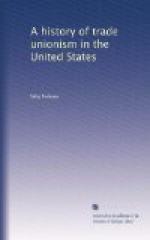The union, incidentally to its policy of protecting the miners, has considerably affected the market or business structure of the industry. An outstanding policy of the union has been to equalize competitive costs over the entire area of a market by means of a system of grading tonnage rates paid to the miner, whereby competitive advantages of location, thickness of vein, and the like were absorbed in higher labor costs. This doubtless tended to eliminate cut-throat competition and thus stabilize the industry. On the other hand, it may have hindered the process of elimination of unprofitable mines, and therefore may be in some measure responsible for the present-day overdevelopment in the bituminous mining industry, which results in periodic unemployment and in idle mines.
In the anthracite coal field in Eastern Pennsylvania the difficulties met by the United Mine Workers were at first far greater than in the bituminous branch of the industry. First, the working population was nearly all foreign-speaking, and the union thus lacked the fulcrum which it found in Illinois with its large proportion of English-speaking miners accustomed to organization and to carrying on a common purpose. Secondly, the employers, instead of being numerous and united only for joint dealing with labor, as in bituminous mining, were few in number besides being cemented together by a common selling policy on top of a common labor policy. In consequence, the union encountered a stone wall of opposition, which its loose ranks found for many years well-nigh impossible to overcome.
During the general strike of 1897 the United Mine Workers made a beginning in organizing the anthracite miners. In September 1900, they called a general strike. Although at that time the union had only 8000 members in this region, the strike order was obeyed by over 100,000 miners; and within a few weeks the strike became truly general. Probably the union could not have won if it had to rely solely on economic strength. However, the impending Presidential election led to an interference by Senator Mark Hanna, President McKinley’s campaign manager. Through him President John Mitchell of the United Mine Workers was informed that the operators would abolish the objectionable sliding scale system of wage payments, increase rates 10 percent and agree to meet committees of their employes for the adjustment of grievances. This, however, did not carry a formal recognition of the union; it was not a trade agreement but merely an unwritten understanding. A part of the same understanding was that the terms which had been agreed upon should remain in force until April, 1901. At its expiration the identical terms were renewed for another year, while the negotiations bore the same informal character.




